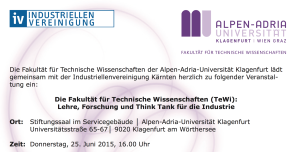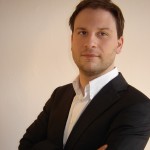 Mittlerweile schon ein Fixtermin im Juni, findet auch heuer wieder die TeWi-Veranstaltung „Lehre, Forschung und Think Tank für die Industrie“ in Kooperation mit der Industriellenvereinigung Kärnten am 25.6. ab 16 Uhr statt.
Mittlerweile schon ein Fixtermin im Juni, findet auch heuer wieder die TeWi-Veranstaltung „Lehre, Forschung und Think Tank für die Industrie“ in Kooperation mit der Industriellenvereinigung Kärnten am 25.6. ab 16 Uhr statt.
Die Welt der Fakultät für Technische Wissenschaften soll sichtbar gemacht werden, sichtbar für die Industrie, die Wirtschaft, die Politik, für Kolleginnen und Kollegen der Universität Klagenfurt und all ihren Studierenden. Es wird aufgezeigt wie wichtig das Studium technischer Berufe ist und wie groß der Durst der Wirtschaft nach jungen Technikerinnen und Technikern in unserem Bundesland und auch im Rest Österreichs ist. Kaum eine Studienrichtung hat solch eine geringe Arbeitslosenquote vorzuweisen wie technische Studiengänge. Kärnten ist dabei sich als hervorragender Standort für Technologie zu etablieren, doch das geht nur indem man genug geeignetes Personal vorfindet.
Mit ständig steigenden Studierendenzahlen ist die TeWi dabei genau diesen Weg möglich zu machen und die Zukunft Kärntens mit zu gestalten. Dekan Gerhard Friedrich meint dazu, dass „…wir gar nicht so viele Absolventinnen und Absolventen produzieren können, wie von der Wirtschaft gebraucht werden“ aber die Kapazitäten wären ausreichend die Zahl erheblich zu steigern.
Wie in jedem Jahr, werden auch heuer wieder die besten studentischen Leistungen an unserer Fakultät belohnt. Die jeweils besten Studenten aus den Studienrichtungen Informatik, Informationsmanagement, Informationstechnik und technische Mathematik, ebenso wie die beste Masterarbeit des Jahres, werden mit Urkunden und Geldpreisen bedacht.
 Die Verflechtung der TeWi mit der Kärntner Wirtschaft ist sehr gut was Grundlagenforschung, Problemlösungen und Expertisen angeht. Natürlich sind darüber hinaus aus unserer Fakultät auch schon einige Unternehmen hervorgegangen die sich äußerst erfolgreich am Markt behaupten. In diesem Jahr werfen wir bei unserer Veranstaltung einen Blick auf „bitmovin“, die von TeWi-Absolventen Stefan Lederer, Christopher Müller und TeWi-Kollegen Christian Timmerer gegründet wurde. Die Firma bietet die weltweit schnellsten Lösungen im Bereich des Online-Streamings an und hat Partner überall auf dem Globus.
Die Verflechtung der TeWi mit der Kärntner Wirtschaft ist sehr gut was Grundlagenforschung, Problemlösungen und Expertisen angeht. Natürlich sind darüber hinaus aus unserer Fakultät auch schon einige Unternehmen hervorgegangen die sich äußerst erfolgreich am Markt behaupten. In diesem Jahr werfen wir bei unserer Veranstaltung einen Blick auf „bitmovin“, die von TeWi-Absolventen Stefan Lederer, Christopher Müller und TeWi-Kollegen Christian Timmerer gegründet wurde. Die Firma bietet die weltweit schnellsten Lösungen im Bereich des Online-Streamings an und hat Partner überall auf dem Globus.
Die Kollegen Markus Zanker und Mathias Lux werden Einblicke in ihre Forschungsarbeit geben und kurze Präsentationen zu den Themen „Online Empfehlungssysteme – Funktionsweise und Wirkung“ bzw. „Bildsuche: Von der Forschung zur praktischen Anwendung“ halten. Wir bieten unseren Gästen auch die Möglichkeit sich aktiv in die Forschung einzubringen und eine kurze Fahrt in unserem Fahrsimulator zu absolvieren. Dabei messen wir Herzfrequenz, Transpiration und Reaktionsgeschwindigkeit der Probanden und können so Rückschlüsse auf den Stresslevel der Fahrer ziehen.
Um den Stresspegel danach wieder zu senken, stellen wir ein reichhaltiges Buffet zur Verfügung und laden all unsere Gäste zu einem gemütlichen Fingerfood Networking ein.
Das genaue Programm finden Sie hier in der offiziellen Einladung. Wir freuen uns sie alle bei uns begrüßen zu dürfen und bitten um Anmeldung unter technik@aau.at.

